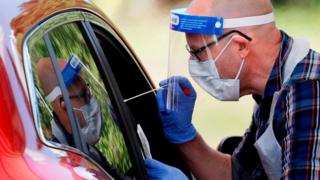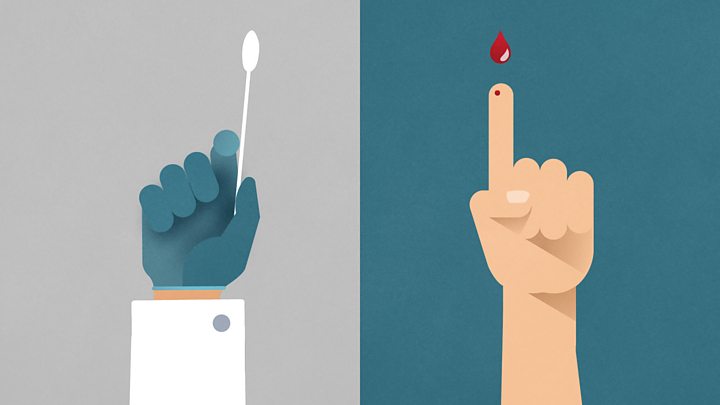Coronavirus: What tests are being done in the UK?
 Image copyright
Getty Images
Image copyright
Getty Images
Testing will be an essential part of the government's contact-tracing system for controlling the epidemic as lockdown eases.
People with symptoms will need to access a test quickly so that, if they are found to have coronavirus, anyone they have been in contact with can be tracked down and told to self-isolate.
Who gets tested?
Anyone with symptoms in the UK can now be tested. People working or living in care homes can be tested even if they don't have symptoms.
If you think you need a coronavirus test you can arrange to visit a regional test site. Alternatively, you can ask for a home test kit.
What is the test?
The tests we're talking about are to find out if you currently have the virus.
They are performed by a taking a swab up the nose or from the back of the throat.
The government is buying another type of test. Antibody tests use a blood sample to find out if you've had the virus in the past.
It will first be made available to health and social care staff, patients and care home residents.
Targets
A number of targets have been set on testing, with the most recent one on capacity.
The government said it wanted UK labs to be able to process 200,000 tests a day by the end of May, and said it reached this on 30 May when capacity hit 205,634. This includes the ability to do 40,000 antibody tests a day.
But capacity does not mean that that many tests are being carried out - only that they could be if enough people were reached or needed one.
Previously, the government set a target that 100,000 coronavirus tests would be carried out per day across the UK by the end of April, and managed to log 122,347 tests on 30 April.
But it was criticised for including in this figure about 40,000 testing kits which had been sent out but not yet completed or processed.
The number of tests performed is not the same as the number of people tested - on 22 May there were 140,497 tests but 80,297 people tested.
The reasons for the gap include:
- some people have to be retested because their test was void
- to check whether someone who had previously tested positive was now negative
- to double check a negative test if someone still appeared to be infected.
Also counted in the tests, but not the people tested, are figures used by the Office for National Statistics to estimate the level of infection within the population as a whole. While this is important, it's not about diagnosing individuals.
While there will now be fewer people with symptoms in the general population, as the epidemic recedes, it's been suggested that the 800,000 people who work for the NHS should be tested about once a week.
Some have suggested health and care staff should be tested, possible twice a week, since the test is most effective around the first three days of having symptoms.
Speed is also of the essence when it comes to the "test and trace" system. People with symptoms need a quick test so the people they have been in contact with can be tracked down and told to isolate. Delays will give more time for the virus to spread.
Anyone with symptoms should immediately isolate, but until they have a positive test, others they already infected who might be asymptomatic might continue spreading the infection.
On 27 May the prime minister committed to an aim of returning all coronavirus tests within 24 hours of the swab being taken.
Later that day the head of the Test and Trace programme, Dido Harding, said 84% of tests at drive-in centres were returned within 24 hours, and 95% within 48 hours. She didn't provide a figure for home testing kits or those provided at other settings.
The Department of Health and Social Care said no formal deadline had been set to achieve this.
Why is testing important?
A "test and trace" system is being launched in England on 28 May meaning anyone with a positive coronavirus test will be contacted to report their recent encounters with people, and places they have visited.
Those who have been in "close contact" with someone who tests positive will have to isolate for 14 days, even if they have no symptoms.
A close contact will include household members and anyone who has been within 2 metres of someone for more than 15 minutes.
A similar scheme is launching in Scotland called Test and Protect.
Tests can also help people, including NHS workers, know whether they are safe to go to work, let the health service plan for extra demand, and inform government decisions around social distancing and lockdowns.
For this reason, an initial 20,000 households in England will be tested every month for a year - for active coronavirus infections and for antibodies indicating a past infection.

Has the UK been too slow in testing for coronavirus?
The UK significantly increased its testing capacity throughout April, but lagged behind many other nations. Germany, for example, was regularly averaging 100,000 tests a day by the start of April.
The UK did not start with the resources to do mass testing, unlike some other countries.
But it also took several weeks to expand from an initial eight public health laboratories to a wider network of private and university labs.
Follow Rachel on Twitter
What do I need to know about the coronavirus?
Have you been tested? Or are you waiting for a test?
Please include a contact number if you are willing to speak to a BBC journalist about your experience.